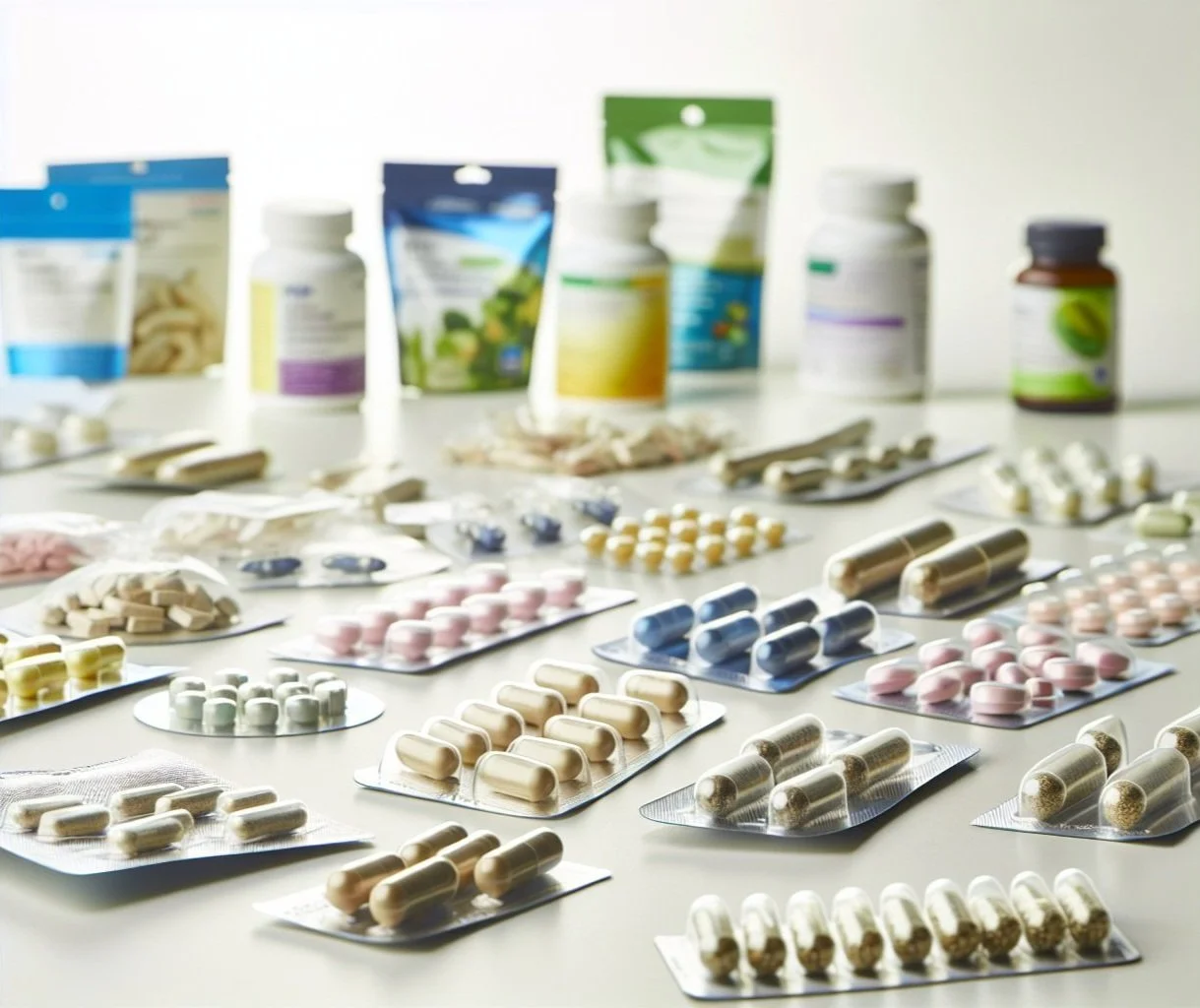Top Strategies for Nurturing Your Health Gut and Boosting Well-Being
Searching for information on a healthy gut? This no-nonsense guide details practical steps for achieving a balanced gut microbiome, linking it straightforwardly to better digestion, stronger immunity, and sharper brain function. We lay out the what and how of gut-enhancing foods, the impacts of lifestyle choices, and the measured use of supplements. Prepare to embrace straightforward, actionable insights for a thriving gut and a healthier you.
Key Takeaways
A diverse and balanced gut microbiome is vital for overall health, responsible for digestion, immune function, and mental health, with practices like consumption of fermented and prebiotic-rich foods and stress management enhancing gut health.
Eating a wholesome diet rich in prebiotic fibers is crucial as these fibers serve as nourishment for the beneficial bacteria in the gut, promoting their growth and activity, which in turn supports a healthy digestive system.
Optimizing gut health involves consuming a variety of probiotic-rich fermented foods, managing stress, and engaging in regular exercise to promote a diverse and balanced gut microbiome.
Regular gut health maintenance to prevent digestive disorders includes dietary choices, exercise, lifestyle adjustments, and regular medical screenings for early detection and prevention of potential problems.
Understanding Gut Health and Its Significance
Consuming a variety of colorful fruits and vegetables is essential for maintaining a diverse gut microbiome, which plays a critical role in supporting immune function and efficient digestion, thereby enhancing overall health and well-being.
Understanding gut health starts with a look at your gastrointestinal (GI) system. This remarkable organ system is responsible for vital processes such as:
digestion
nutrient absorption
waste elimination
maintaining a normal and stable microbiome
supporting the immune system
It’s like a busy highway where food travels and gets processed into nutrients that fuel your body.
The gut microbiome, a complex community of microbes residing in our digestive tract, is integral to this process. It consists of approximately 10,000 different bacterial species and fungi, which are categorized into aerobic and anaerobic types. A healthy gut microbiome has a profound impact on physical and mental health, affecting immunity, metabolism, and even brain function. Preventing chronic diseases, controlling inflammation, supporting brain health, and managing weight all require a balanced gut microbiome.
The Role of Good Bacteria in Digestive Health
Consider the good bacteria in your gut as the superheroes of your digestive system. They are essential for:
Metabolizing dietary fibers and polyphenols, which enhances the energy yield from your diet and helps you absorb nutrients
Producing essential nutrients, including synthesizing vitamin K
Maintaining resistance against harmful bacterial colonization by competitively excluding pathogens and producing antimicrobial substances.
Lactobacillus and Bifidobacterium, healthy bacteria found in fermented foods, play a role in digestion, support chronic disease prevention, and heart and skin health maintenance. So, the next time you enjoy some yogurt or kimchi, remember to thank the beneficial bacteria hard at work!
The Gut-Brain Connection
Ever wondered why you get butterflies in your stomach when you’re nervous or why you crave certain foods when you’re stressed? That’s the gut-brain connection in action! This connection has a significant influence on our mental health, with gut bacteria producing neurotransmitters such as serotonin, dopamine, and glutamate, which are critical for brain function.
Dysbiosis, or an imbalance in the gut microbiota, is associated with mental health disorders such as anxiety and depression, with bacteria like Firmicutes and Bacteroidetes playing a significant role through the microbiota–gut–brain axis. Changes in diet and regular exercise can influence this gut-brain communication, potentially preventing and treating mental disorders and improving brain function.
Optimizing Your Diet for a Healthy Gut Microbiome
Begin your day with a serving of probiotic-laden yogurt topped with a medley of fresh berries. Each dawn, a deliberate scoop of smooth, bacteria-rich yogurt coupled with the natural sweetness and antioxidants from berries cultivates your gut's microbial community, paving the way for digestive wellness and enhancing your general health.
The path to a healthy gut microbiome goes straight through your plate. Here are some foods that can lead to a robust gut microbiome, teeming with beneficial bacteria:
A variety of real, whole plant-rich foods. Limit eating plant-based ultra processed foods.
High fiber
Whole grains
Foods rich in polyphenols
Fermented foods, known for their probiotic content. Opt for naturally fermented products rather than those that use synthetic strains.
These foods can help improve your gut health and support gut health naturally.
Staying well-hydrated promotes a healthy gut environment and a high-carbohydrate diet can lead to more stable gut microbiota, especially in endurance athletes. The manner in which you eat is as important as what you eat.
Probiotic Powerhouses
Foods rich in probiotics that boost your gut health include:
Yogurt
Kimchi
Sauerkraut
Kefir
Kombucha
Tempeh
Incorporating these foods into your diet can help foster a healthy gut microbiome.
Each of these foods brings additional benefits:
Kimchi, for example, is made with cruciferous vegetables that impart antioxidant properties
Kombucha stands out as a fizzy tea drink with a probiotic boost
Tempeh, made from fermented soybeans, is not only a source of probiotics but also provides nutrition like protein, B vitamins, and essential minerals
It’s like a two-for-one deal for your gut! Remember not all products are created equally so don't fall for mainstream marketing speak. Look for brands that stand out and have done clinical studies to substantiate their health claims.
Benefits and Risks of Fermented Foods
Despite the benefits of fermented foods for gut health, moderation is key, as with most things in life. Overconsumption can lead to potential risks, such as bloating and gas due to the high fiber content, especially if your body isn’t used to it.
Keep in mind that not all fermented foods have the same quality or benefits. Some store-bought pickled foods, for example, may not have the same probiotic benefits as homemade ones and could contain added sugars or preservatives. As always, reading labels and knowing what you’re putting into your body is key.
Prebiotic-Rich Foods to Feed Your Microbiota
Prebiotics, the unsung heroes of gut health, are a type of fiber that your body can’t digest. They serve as food for the beneficial bacteria in your gut, helping them thrive. Foods high in prebiotics include:
Garlic
Onions
Leeks
Asparagus
Whole grains
among others.
You can creatively incorporate these foods into your diet in various dishes like:
salads
dressings
homemade granola
spreads
Regular consumption of a diverse range of prebiotic-rich foods supports the growth of beneficial gut bacteria, contributing to a stable and healthy gut microbiota.
Lifestyle Adjustments for Gut Health Enhancement
In the tranquility of a green haven, Anna unfurls her yoga mat. As she transitions from one pose to another, the weight of stress lifts, and her gut's microflora thrives. The calm of the natural surroundings enriches her inner world, encouraging a harmony of beneficial microbes. With equilibrium regained, Anna's wellbeing flourishes, mirroring the vibrant forest that envelopes her.
Beyond what you eat, how you live also affects your gut health. For instance, chronic stress can harm gut health by fostering the growth of harmful bacteria and enhancing intestinal permeability, a condition known as leaky gut. On the other hand, managing stress through techniques such as deep breathing exercises, meditation, and spending time in nature can help protect and improve gut microbiome health.
Besides stress management, regular exercise has shown benefits for the gut microbiome by reducing levels of bacteria that promote colorectal cancer and promoting the growth of beneficial gut bacteria. To maintain optimal gut health, ensure you get adequate, uninterrupted sleep, ideally 7–8 hours per night. Practicing mindful eating by savoring each bite without distractions also contributes to improved digestion and can help alleviate stress-related digestive issues.
The Impact of Stress on Your Gut
Stress triggers our bodies to release certain hormones, which can disturb our gut balance. This can encourage the growth of pathogenic bacteria, leading to gut microbiota imbalances (dysbiosis) and increased intestinal permeability, also known as leaky gut. These changes can result in a range of symptoms, including:
Digestive discomfort
Changes in eating behaviors
Bloating
Diarrhea
Constipation
Nausea
Abdominal pain
It is important to manage stress and take steps to support a healthy gut to minimize these symptoms.
To maintain a healthy gut bacteria balance and mitigate food intolerance symptoms exacerbated by stress, stress management is essential. So, next time you’re feeling stressed, try a few deep breaths, a walk in nature, or a mindfulness exercise. Your gut will thank you!
Exercise's Role in a Healthy Gut
Besides benefiting your waistline, exercise also positively affects your gut health! Regular exercise can induce detectible shifts in some bacterial species within the gut, contributing to a healthier microbiome. Moderate-intensity exercise can support overall immune function and health, and enhance gut health independently of diet.
Moreover, a diverse gut microbiota resulting from regular exercise may positively impact exercise endurance and physical performance. So, whether you’re a fan of yoga, jogging, or lifting weights, your gut will benefit from your physical activity.
Identifying and Addressing Poor Gut Health
At home, Emma makes a mindful choice, steering clear of processed snacks and opting for whole grains. Her pantry reflects her dedication to gut health, stocked with an array of unrefined grains and colorful, fresh produce, each item thoughtfully chosen to cultivate a thriving gut microbiome.
Various symptoms, such as gas, bloating, constipation, diarrhea, and heartburn, may indicate poor gut health. Disturbances in gut health can also manifest as sleep disturbances, constant fatigue, and unintentional weight changes. Changes in bowel patterns, especially those ranging outside the normal frequency, are an indication of possible gut health issues.
If you have persistent symptoms like:
unexplained abdominal pain
weight loss
blood in stool
changes in bowel habits
unresponsive gastrointestinal symptoms despite dietary or lifestyle changes
These could be signs of irritable bowel syndrome.
Seeking medical advice is vital.
Troublesome Foods and Food Intolerances
Certain foods can disagree with us. Some may struggle with lactose or gluten, while others may have issues with ultra-processed foods laden with added sugars, salts, unhealthy fats, or additives.
Avoiding foods that upset your stomach can improve your digestive comfort. For instance, if gluten causes discomfort, consider alternatives like the traditional sourdough, which may be easier to digest. Reducing the intake of known trigger foods can prevent stress-related digestive problems.
Impact of Emulsifiers on Gut Health
Emulsifiers in processed foods can adversely affect gut health. They can are added to food to enhance texture and shelf life, but can have negative consequences, including but not limited to:
Disrupt the delicate balance of your gut microbiota
Lead to inflammation
Increase the risk of disease.
So, next time you’re grocery shopping, take a moment to read the labels. Limiting your consumption of processed foods with emulsifiers can be a step towards a healthier gut.
Supplements for Gut Health: Are They Necessary?
Shelves are adorned with an array of probiotic and prebiotic supplements, each claiming to be the panacea for gut health. However, discerning shoppers must wade through the sea of marketing hype to find the rare gems backed by solid science that can truly orchestrate a balanced gut ecosystem.
Ads for probiotic and prebiotic supplements promising gut health improvements are common. However, are these supplements truly necessary? While research indicates that these supplements can be beneficial, they’re not a cure-all solution for gut health.
Obtaining probiotics and prebiotics from whole-food sources remains the best option. However, if you’re considering supplements, it’s important to consult with a healthcare professional to ensure they fit your individual health needs and conditions. Especially for individuals with severe underlying illnesses or weakened immune systems, probiotic supplements should be avoided.
Evaluating Probiotic Supplements
Keep in mind that not all probiotics are created equal when selecting a probiotic supplement. The effectiveness of probiotics varies depending on the particular species and strains. This means that a specific strain of Lactobacillus might help with one health concern, while another strain of the same species might not.
Commonly recommended probiotic strains include Lactobacillus, Bifidobacterium, and Saccharomyces. To choose the right supplement, consult with a healthcare professional who can guide you based on your individual health needs and conditions.
The Synergy of Prebiotics and Probiotics
To optimize your gut health, synbiotics, a blend of prebiotics and probiotics, can be considered. Synbiotics may enhance the survival and colonization of beneficial microorganisms in the gut, providing greater benefits for host health than prebiotics or probiotics alone.
Synbiotics aim to improve gut health by supporting the growth and activity of healthy gut bacteria. So, by combining prebiotics and probiotics, you’re giving your gut the best of both worlds!
Preventative Measures Against Digestive Disorders
Dietary and lifestyle measures are the starting point for preventing digestive disorders. Some measures to consider include:
Consuming fiber-rich foods
Eating whole grains
Drinking plenty of water
Avoiding processed foods
Limiting alcohol and caffeine intake
These measures can help reduce the risk of metabolic diseases and colorectal cancer.
But prevention goes beyond what’s on your plate. Regular screenings and health check-ups play a significant role in maintaining gut health, allowing for early detection of potential gastrointestinal problems and prevention of more serious conditions.
Regular Screenings and Health Check-ups
To maintain gut health and prevent digestive disorders, regular medical check-ups and screenings are imperative. Not only do these check-ups aid in the early detection of potential gastrointestinal problems, but they also prevent more serious conditions from developing.
Regular screenings can detect early signs of gut abnormalities or indicators like inflammatory markers, essential to prevent diseases such as colon cancer. Consistent medical monitoring and follow-up can lead to ongoing maintenance of a healthy gut microenvironment.
Summary
We’ve embarked on a fascinating journey into the world of gut health, exploring the intricate connections between our gut microbiome, diet, lifestyle, and overall well-being. From understanding the significance of gut health to the benefits of a balanced diet, from the role of lifestyle adjustments to the importance of regular medical check-ups, we’ve seen how every aspect of our lives can impact our gut health. So, listen to your gut and make the changes necessary for a healthier, happier life. Your gut will thank you!
Frequently Asked Questions
How can I improve my gut health?
To improve your gut health, focus on eating a high-fiber diet, consuming a diverse range of foods, limiting ultra-processed foods, and incorporating naturally fermented foods into your meals. These habits can promote a healthier gut.
How do I repair my gut?
To repair your gut, consider incorporating probiotics and fermented foods, eating fiber-rich foods, reducing stress, getting regular exercise, and consulting with your doctor about adding a probiotic supplement. Date not available.
What are the symptoms of an unhealthy gut?
If you have an unhealthy gut, you may experience symptoms such as digestive issues, skin irritations, sugar cravings, and fatigue. Paying attention to these signs can help you take steps to improve your gut health.
What are the 3 super foods for your gut?
Fermented foods like kimchi and sauerkraut, prebiotic-rich foods like garlic and onions, and probiotic-rich foods like yogurt and kefir are superfoods for your gut because they contain beneficial bacteria that promote digestion and nutrient absorption.
How can diet impact gut health?
Eating a diverse, balanced diet with plant-based foods, fiber, whole grains, polyphenols, and fermented foods can promote a healthy gut microbiome, improving overall gut health.
Disclaimer
The information provided in this article is for educational and informational purposes only and is not intended as medical advice. While we strive to provide accurate and up-to-date information, we make no representations or warranties of any kind, express or implied, about the completeness, accuracy, reliability, suitability, or availability with respect to the content. The information contained herein should not be used as a substitute for the advice of an appropriately qualified and licensed physician or other healthcare provider. The suggestions and insights should not be used for diagnosing or treating a health problem or disease, or prescribing any medication. Always seek the advice of your physician or other qualified health provider with any questions you may have regarding a medical condition or treatment and before undertaking a new health care regimen. Never disregard professional medical advice or delay in seeking it because of something you have read on this site.
References
Al Bander Z, Nitert MD, Mousa A, Naderpoor N. The Gut Microbiota and Inflammation: An Overview. Int J Environ Res Public Health. 2020 Oct 19;17(20):7618. doi: 10.3390/ijerph17207618. PMID: 33086688; PMCID: PMC7589951.
Aleman RS, Moncada M, Aryana KJ. Leaky Gut and the Ingredients That Help Treat It: A Review. Molecules. 2023 Jan 7;28(2):619. doi: 10.3390/molecules28020619. PMID: 36677677; PMCID: PMC9862683.
Dias LKM, de Medeiros GCBS, Silva AKN, de Araujo Morais AH, da Silva-Maia JK. Can polyphenols improve the gut health status in pre-clinical study with diet-induced obesity?: A protocol for systematic review and/or meta-analysis. Medicine (Baltimore). 2021 Dec 10;100(49):e28162. doi: 10.1097/MD.0000000000028162. PMID: 34889285; PMCID: PMC8663835.
Fu J, Zheng Y, Gao Y, Xu W. Dietary Fiber Intake and Gut Microbiota in Human Health. Microorganisms. 2022 Dec 18;10(12):2507. doi: 10.3390/microorganisms10122507. PMID: 36557760; PMCID: PMC9787832. Dietary Fiber Intake and Gut Microbiota in Human Health - PubMed (nih.gov)
Gagliardi A, Totino V, Cacciotti F, Iebba V, Neroni B, Bonfiglio G, Trancassini M, Passariello C, Pantanella F, Schippa S. Rebuilding the Gut Microbiota Ecosystem. Int J Environ Res Public Health. 2018 Aug 7;15(8):1679. doi: 10.3390/ijerph15081679. PMID: 30087270; PMCID: PMC6121872.
Gomez Quintero DF, Kok CR, Hutkins R. The Future of Synbiotics: Rational Formulation and Design. Front Microbiol. 2022 Jul 22;13:919725. doi: 10.3389/fmicb.2022.919725. PMID: 35935226; PMCID: PMC9354465.https://www.ncbi.nlm.nih.gov/pmc/articles/PMC9354465/
Hills RD Jr, Pontefract BA, Mishcon HR, Black CA, Sutton SC, Theberge CR. Gut Microbiome: Profound Implications for Diet and Disease. Nutrients. 2019 Jul 16;11(7):1613. doi: 10.3390/nu11071613. PMID: 31315227; PMCID: PMC6682904.
Khalili L, Centner AM, Salazar G. Effects of Berries, Phytochemicals, and Probiotics on Atherosclerosis through Gut Microbiota Modification: A Meta-Analysis of Animal Studies. Int J Mol Sci. 2023 Feb 4;24(4):3084. doi: 10.3390/ijms24043084. PMID: 36834497; PMCID: PMC9960548.
Khatib MA, Saleemani HH, Kurdi NB, Alhibshi HN, Jastaniah MA, Ajabnoor SM. Low Emulsifier Diet in Healthy Female Adults: A Feasibility Study of Nutrition Education and Counseling Intervention. Healthcare (Basel). 2023 Sep 28;11(19):2644. doi: 10.3390/healthcare11192644. PMID: 37830680; PMCID: PMC10572653.
Li HY, Zhou DD, Gan RY, Huang SY, Zhao CN, Shang A, Xu XY, Li HB. Effects and Mechanisms of Probiotics, Prebiotics, Synbiotics, and Postbiotics on Metabolic Diseases Targeting Gut Microbiota: A Narrative Review. Nutrients. 2021 Sep 15;13(9):3211. doi: 10.3390/nu13093211. PMID: 34579087; PMCID: PMC8470858.
Mazzucca CB, Raineri D, Cappellano G, Chiocchetti A. How to Tackle the Relationship between Autoimmune Diseases and Diet: Well Begun Is Half-Done. Nutrients. 2021 Nov 5;13(11):3956. doi: 10.3390/nu13113956. PMID: 34836210; PMCID: PMC8620243.
Richey Levine A, Picoraro JA, Dorfzaun S, LeLeiko NS. Emulsifiers and Intestinal Health: An Introduction. J Pediatr Gastroenterol Nutr. 2022 Mar 1;74(3):314-319. doi: 10.1097/MPG.0000000000003361. PMID: 35226642.
Rinninella E, Cintoni M, Raoul P, Lopetuso LR, Scaldaferri F, Pulcini G, Miggiano GAD, Gasbarrini A, Mele MC. Food Components and Dietary Habits: Keys for a Healthy Gut Microbiota Composition. Nutrients. 2019 Oct 7;11(10):2393. doi: 10.3390/nu11102393. PMID: 31591348; PMCID: PMC6835969.
Yin R, Kuo HC, Hudlikar R, Sargsyan D, Li S, Wang L, Wu R, Kong AN. Gut microbiota, dietary phytochemicals and benefits to human health. Curr Pharmacol Rep. 2019;5:332-344. doi: 10.1007/s40495-019-00196-3. Epub 2019 Aug 19. PMID: 33224717; PMCID: PMC7678755. Gut microbiota, dietary phytochemicals and benefits to human health - PubMed (nih.gov)





